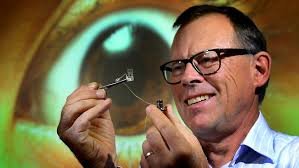'Research funding a global challenge'
May 15, 2014 | Thursday | Interviews | By BioSpectrum Bureau
'Research funding a global challenge'
Prof Rob Shepherd, director, Bionics Institute, and Professor of Medical Bionics, Medical Bionics Department, the University of Melbourne
He is an expert in the field of safety and efficacy of neural prostheses using both in-vitro and in-vivo research techniques. He was part of Graeme Clark's original cochlear implant team and has 35 years of experience working in the field of medical bionics.
He has established the world's pre-eminent laboratory for performing chronic electrical stimulation studies across a wide variety of animal models and neural applications.
The Australian Academy of Sciences in collaboration with the Australian Government Department of Industry, Innovation, Climate Change, Science, Research and Tertiary Education (DIICCSRTE) organized a speaker series with eminent Australian researchers to India.
Among them, Prof Rob Shepherd visited India and was seen in Bangalore in December 2013, with the aim to raise awareness of Australian research and facilitate collaborative linkages with Indian researchers and institutions.
"We hope to set up more collaborations to understand the clinical needs of organizations in India, and work together to develop applications for the Indian community, which can have significant potential offering lowest of costs," began Prof Shepherd.
Of late, the Victorian government has been very proactive in driving commerce and research education in collaboration between India and Australia.
"We see a real future in Australia by working closely with India. It is a lot easier in India because of its huge population, who are mostly young, and the technical expertise India has in the field of engineering is exceptional. However, the major challenge is that experts have very little time to commit for research. But there plenty of entrepreneurial spirit in India," emphasized Prof Shepherd.
Prof Shepherd led Bionic Vision Australia's preclinical research program which resulted in the design and manufacture of Australia's first prototype 'Bionic Eye', implanted in three blind subjects in 2012.
The Bionic eye was developed for people who have inherited blindness. Currently, the bionic limbs are still in clinical trials stage.
Talking about collaborations with India, he opined, "Australia has a smaller population lacking venture capitalists or any form of funding for research. People from different countries will bring in various skill sets and culture to tackle a problem. No one individual or organization has all the skill sets to design and develop everything. There is a real opportunity to work with Indian colleagues to develop the technology which will have major clinical impact in India and vice versa."
Prof Shepherd believes that it is very difficult for researchers to make big careers. "I have seen many colleagues forsake research and pursue administration or become patent attorneys. The pressure of receiving a successful grant is a cumbersome process altogether. Hence, the funding scene seems extremely competitive. Scientists have got lesser options compared to clinicians or engineers," he explained.
According to Prof Shepherd, for India, Australia offers wide opportunities in areas of medical sciences, drug development, life sciences, bioengineering, prosthetics, IT & satellite communications, drug delivery and nanotechnology, which occupy pivotal importance.
He says funding is a mammoth challenge for researchers. "In India, scientists have told me that it is extremely difficult to get funding for research. I too have witnessed the difficulty in getting the necessary funds for medical research. Most of the time, funding is always problematic around the world. However, I'm very impressed with the number of laboratories with advanced equipments and infrastructure here in India," he continues.
Prof Shepherd sees huge potential through venture capitalists in India. "Not everybody can commercialize research. The government should be very open about funding the commercialization process. Venture capitalists have huge potential in India. I have been talking to a number of directors here and have been pleased with their philanthropist attitude. If there is potential to commercialize research, then funding has to be structured by bringing commercial partners, where the government along with the commercial partner can co-fund the research. There is not much of public-private partnerships in Australian medical research happening," he elucidated.
Australian and Indian research policy has been highly successful said Prof Shepherd. "Many Australian Universities have devised specific scholarships for Indian Universities so that there is mutual exchange of human resource and knowledge."
Prof Shepherd strongly believes that establishing a firm collaboration is just the beginning.
"There is no reason why we can't be developing technologies together. Implementing devices, visual prosthetics, predicting epileptic seizures - there is a lot of interest from Indian organizations in using these technologies, additionally to using cochlear implantation technology, which is being widely used. We can expect to manufacture products within India, and this will open up other avenues in the Middle East and African countries," he concluded.









